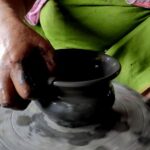Sugna Devi of Uniara in the Tonk district of Rajasthan recounts her life as a farmer and a micro-entrepreneur. This is her story – in her own words.
My husband worked as a labourer at the Kalptaru Power Plant in Uniara. And I worked as a farm labourer.
I also worked on my field, growing wheat and mustard. But COVID snatched away my husband in May 2021. My life came to a standstill.
Financially, I was broke. And emotionally, I was broken. I thought I’d lost it all at just 38 years of age.
But I pulled myself together since I had to provide for my three children and an aging mother-in-law.
When my husband and I earned, it was just about enough to make ends meet for our large family.
With him gone, a large proportion of the earnings was gone. We were in for real distress.
But being the member of a self-help group proved to be really helpful.
An NGO (the Louis Dreyfus Foundation) came to train women farmers in making organic manure and pesticide. And I grasped the opportunity instantly.
Till then our village farmers – both men and women – had been using chemical pesticide and manure. We learnt about the benefits of chemical-free natural farming.
We learnt that using natural resources would rejuvenate our lands, sustain biodiversity and protect the environment.
Using things like jaggery and gram flour in addition to natural resources like cow dung and urine, I learnt to make four organic products – brahmastra, neemastra, jeevamrut and beejamrut.
I have two cows but their dung and urine are not enough. So all my friends and fellow women farmers pitch in.
We make these organic manures collectively, helping each other and bonding as well.
It’s a tedious process. We mix all the ingredients thrice daily for five minutes. It takes around 15 days to turn into fertiliser.
Then it is sprayed on plants and on the roots of plants. It is beneficial for the soil too. Now I know the importance of soil fertility.
Using these traditional bio-pesticides saves us a lot of money. I also sell it at Rs 5 per litre.
I have also started growing papaya and vegetables other than main crops on my land.
After my husband’s death, my annual income had come down to Rs 65,000. Because of all these works, my income has now increased to around Rs 83,600 per year. But it’s not enough to sustain us.
I also work as a community resource person, training my fellow farmers to make these natural bio-pesticides and fertiliser.
Many have adopted these sustainable agricultural practices but many others still need to be brought into natural farming.
Although I feel exhausted sometimes after all the talking, explaining and household work, I keep going. Because it’s work that makes me happy and keeps me occupied.
I still don’t have much of financial security. But now I feel confident that I can find work for myself and earn.
I recently bought a mechanised wheat-grinding machine (atta chakki) costing around Rs 17,000. When I spend my own hard-earned money, I feel content.
I am often called the ‘manure missy’ of my village, and I don’t mind.
Reporting and photographs by Rakhee Roytalukdar, a journalist based in Jaipur.











